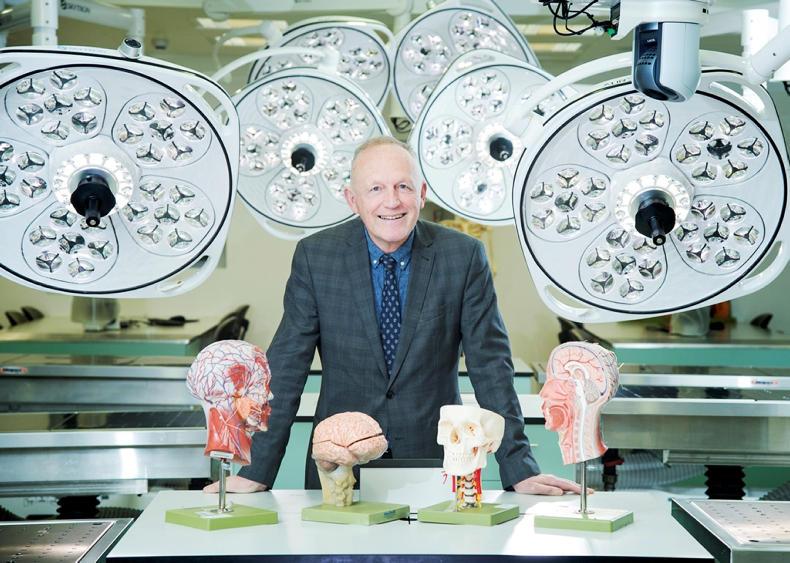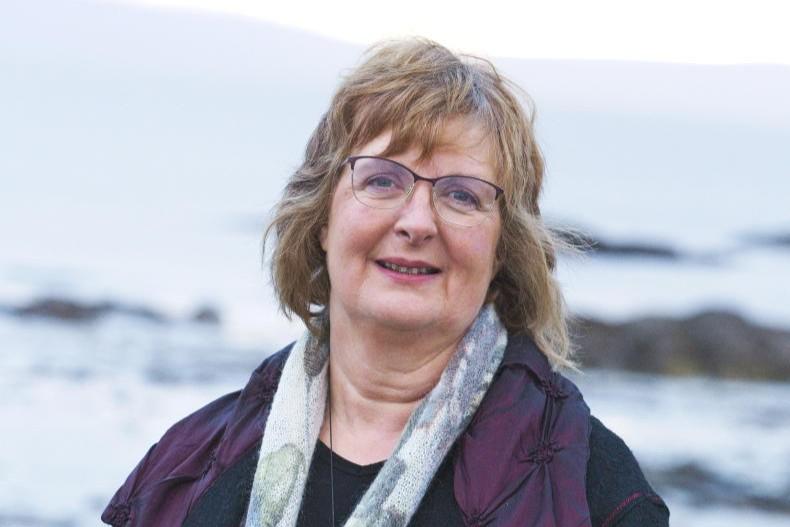One kilogram – that’s how much microbiota (good bacteria) the average adult has in his/her intestine. And there can be as many as 1,000 strains within that 1kg.
“We are pivotally dependent on these organisms to produce molecules that the organs in our body require,” says Prof Ted Dinan.
He is a consultant psychiatrist and one of the founders of the Cork-based gastro-intestinal health research organisation APC Microbiome Ireland. It was set up 15 years ago by doctors and scientists, is based in UCC and Teagasc Moorepark and now employs 300 people.
Microbiota is now one of the hot areas of medicine
“Because we can’t make these molecules ourselves we need to feed them by eating good food. In return they produce molecules that our organs and bodies require.”
APC’s work has meant that knowledge of our microbiota has increased hugely.
“Microbiota is now one of the hot areas of medicine,” he says. “(Discoveries related to it) are highly relevant in relation to obesity and diabetes, also to treating antibiotic-resistant infections, to heart health and in my own area of specialty, mental health.”
As a professor of psychiatry at UCC, a principal investigator at APC and author of 450 research papers, it is hoped that his own work could lead, in time, to new classes of medications for the treatment of psychiatric disorders. That’s because of its new insights into the relationship between gut bacteria and behavior.
Other researchers at APC are concentrating on developing prebiotics to treat/prevent a range of physical illnesses.
Depression and microbiota
The microbes in the gut of people with severe depression have a different bacterial content, Prof Ted Dinan says.
“Their diversity of microbes has decreased and they show an increase in inflammatory molecules also. It all goes back to diet because what you eat feeds these microbes and if we feed microbes badly we end up with a bad microbiota.”
I tell them they need oily fish twice a week to get the required polyunsaturated fatty acids
Two out of three of his patients say they don’t eat fish – something that concerns him.
“I tell them they need oily fish twice a week to get the required polyunsaturated fatty acids. We cannot manufacture these ourselves so we need to eat oily fish.
"I say to patients that the brain is a fatty organ and the main fat in it is polyunsaturated fatty acids so we need them in our diet. We get them by eating fish.”
Processed foods
Prof Dinan is alarmed by the increase in the intake of processed foods in this country, too, from the point of view of mental health as it has been proven that those who have the highest intake of processed foods also have the highest rates of mental health problems.
“Our intake of highly processed food goes up by the decade and then you’ll find health food stores on high streets selling capsules with all sorts of nutritional ingredients but the best source of good nutrients is in good food. It isn’t in a capsule.”
Our national tendency to not eat enough vegetables is a concern too. “Everyone needs a good variety of food and vegetables.
"A lot of people don’t eat a wide variety of vegetables. Most children turn their noses up at cabbage, but cabbage is a nutritional source of polyphenols, for example.
"We get polyphenols from fruit and veg, they are rich with antioxidants and anti-inflammatories.”

Consultant psychiatrist Professor Ted Dinan of UCC and APC Microbiome Ireland– the Cork-based gastro-intestinal health research organisation.
But is it that people don’t like cooking or that they’ve got a taste for processed foods?
“A lot of it is related to that but it is so important to change our thinking and eat well. Take fibre, for instance. We’ve known the value of fibre for centuries.
“Processed food diets tend to be very low in fibre. Some fibres are prebiotic – that means they stimulate the growth of good bacteria like Bifidobacteria.
"We therefore need to eat this fibre in the likes of celery, Jerusalem artichokes, leeks, garlic, onions and bananas.”
It’s a comforting message – knowing that a good diet can help one’s mental health, he says.
“Even where drugs are necessary it is so helpful for patients if they do go on a more appropriate diet with exercise as well. This is fundamental for treating mental health problems.”
The affect of too many antibiotics
Our grandparents had microbes that we are now missing, he points out, and this is partly due to eating processed foods and using more and more antibiotics.
“Antibiotics are one of the most appropriate life-saving medications that have ever been developed but they are over utilised for things like viruses that they have no impact on at all.
"You end up with antibiotic resistance emerging in bacteria and antibiotics lose efficacy.
"The microbiota can be seriously damaged by taking in unnecessary antibiotics. It completely depletes your gut of good microbes.”
Diabetes and metabolic syndrome
APC Microbiome Ireland scientists, including Prof Catherine Stanton of Teagasc Moorepark and Prof John Cryan of UCC, have provided preclinical evidence of altered microbiota in diabetes.
“Many research groups are trying to target the microbiota to see if they can alter the microbiota in a way that will improve type 2 diabetes.
People with metabolic syndrome have a very altered microbiota
A group in Belgium that we have close contacts with has already come up with a strain of bacteria called akkermancia that seems to be particularly effective in treating the metabolic syndrome and could be effective in relation to diabetes type 2 as well.”
Metabolic syndrome is a cluster of conditions that includes increased blood pressure, high blood sugar, excess body fat around the waist and abnormal cholesterol or triglyceride levels.
“People with metabolic syndrome have a very altered microbiota,” Prof Dinan says, “and in experiments it has been found that if you transplant microbiota from that person the syndrome is transplanted with the microbiota too.”
Similarly microbiota taken from a person with depression’s intestine could cause depression in the recipient so, in the future, if transplants do take place, donors would have to agree to a psychiatric assessment.
“We believe that could happen so transplant is not something that we would advise.”
Diverse microbiota means ageing well
APC research has also shown that if elderly people lose diversity in their microbiota they become frail very rapidly.
“The key to successful ageing therefore – ageing without becoming unduly frail – is maintaining diversity in the microbiota.
“Good diet and exercise is key to that. There are companies associated with APC who are trying to develop products, of course, that will help to sustain that diversity.
“These could be food components or might even involve ingesting bacteria or prebiotics. There are all sorts of possibilities. The key would be to maintain diversity as long as possible.”
Yet to discover
Scientists have yet to find out what many of our gut microbes do, he says.
“There are a lot of different strains within the gastro-intestinal tract and some that we still haven’t got a clue about.”
People who are obese also have an altered microbiota, APC Microbiome research has shown.
“Microbiota play a role in the actual maintenance of the obesity. This has been proven via research done after microbiota transplants took place.”
The microbiota transplants the tendency toward weight gain to the other individual
This is where microbiota have been transplanted from one patient to another (via a stool sample) by gastroenterologists to treat C difficile infection – a hard-to-kill superbug which causes vomiting and diarrhea.
“C diff responds very well to microbiota transplant,” he says, “and the results of transplant studies are fascinating.”
These results show that if you take the microbiota from an obese person and transplant it into a lean individual, that lean individual will gain considerable amounts of weight.
“The microbiota transplants the tendency toward weight gain to the other individual.”
While microbiota transplants are not available for obesity or mental health-related problems currently, the Professor doesn’t know if they will be available in the future.
“We can’t say yet but the success rate of microbiota transplant for C diff is about 90% so great success has been seen with that.”
The big challenge in medicine now is around how microbiota can be altered in a way that can promote good health – and developing products that can help.
He gives the example of babies born by Caesarian section.
“They clearly have a very abnormal microbiota over the first two or three years. They pick up microbes initially from the skin of the doctor and mother rather than from the mother’s birth canal. C-section rates are getting higher all the time – 35% in Ireland now, in China in some parts over 80%, Manhattan over 55%, Brazil over 50%... If those babies end up having antibiotics on top of this (lack of microbiota) it makes the situation far more abnormal and the children may be more vulnerable to allergies, for example.”
Some APC scientists are therefore working to develop microbiota for such babies.
“They’re asking: ‘How can we provide a newborn baby with a consortium of bacteria so that they have a good microbiota from the word go and are not dependent on the passage of time to develop a normal microbiota?’”
Probiotics are live bacteria which when we ingest them have a positive benefit on our health, eg the live bacteria found in yoghurt. A prebiotic is usually a dietary fibre (found in vegetables like celery) which, when we ingest it, stimulates the growth of good bacteria. Read more
What can a tattoo do for you?
When baby blues turn to depression
One kilogram – that’s how much microbiota (good bacteria) the average adult has in his/her intestine. And there can be as many as 1,000 strains within that 1kg.
“We are pivotally dependent on these organisms to produce molecules that the organs in our body require,” says Prof Ted Dinan.
He is a consultant psychiatrist and one of the founders of the Cork-based gastro-intestinal health research organisation APC Microbiome Ireland. It was set up 15 years ago by doctors and scientists, is based in UCC and Teagasc Moorepark and now employs 300 people.
Microbiota is now one of the hot areas of medicine
“Because we can’t make these molecules ourselves we need to feed them by eating good food. In return they produce molecules that our organs and bodies require.”
APC’s work has meant that knowledge of our microbiota has increased hugely.
“Microbiota is now one of the hot areas of medicine,” he says. “(Discoveries related to it) are highly relevant in relation to obesity and diabetes, also to treating antibiotic-resistant infections, to heart health and in my own area of specialty, mental health.”
As a professor of psychiatry at UCC, a principal investigator at APC and author of 450 research papers, it is hoped that his own work could lead, in time, to new classes of medications for the treatment of psychiatric disorders. That’s because of its new insights into the relationship between gut bacteria and behavior.
Other researchers at APC are concentrating on developing prebiotics to treat/prevent a range of physical illnesses.
Depression and microbiota
The microbes in the gut of people with severe depression have a different bacterial content, Prof Ted Dinan says.
“Their diversity of microbes has decreased and they show an increase in inflammatory molecules also. It all goes back to diet because what you eat feeds these microbes and if we feed microbes badly we end up with a bad microbiota.”
I tell them they need oily fish twice a week to get the required polyunsaturated fatty acids
Two out of three of his patients say they don’t eat fish – something that concerns him.
“I tell them they need oily fish twice a week to get the required polyunsaturated fatty acids. We cannot manufacture these ourselves so we need to eat oily fish.
"I say to patients that the brain is a fatty organ and the main fat in it is polyunsaturated fatty acids so we need them in our diet. We get them by eating fish.”
Processed foods
Prof Dinan is alarmed by the increase in the intake of processed foods in this country, too, from the point of view of mental health as it has been proven that those who have the highest intake of processed foods also have the highest rates of mental health problems.
“Our intake of highly processed food goes up by the decade and then you’ll find health food stores on high streets selling capsules with all sorts of nutritional ingredients but the best source of good nutrients is in good food. It isn’t in a capsule.”
Our national tendency to not eat enough vegetables is a concern too. “Everyone needs a good variety of food and vegetables.
"A lot of people don’t eat a wide variety of vegetables. Most children turn their noses up at cabbage, but cabbage is a nutritional source of polyphenols, for example.
"We get polyphenols from fruit and veg, they are rich with antioxidants and anti-inflammatories.”

Consultant psychiatrist Professor Ted Dinan of UCC and APC Microbiome Ireland– the Cork-based gastro-intestinal health research organisation.
But is it that people don’t like cooking or that they’ve got a taste for processed foods?
“A lot of it is related to that but it is so important to change our thinking and eat well. Take fibre, for instance. We’ve known the value of fibre for centuries.
“Processed food diets tend to be very low in fibre. Some fibres are prebiotic – that means they stimulate the growth of good bacteria like Bifidobacteria.
"We therefore need to eat this fibre in the likes of celery, Jerusalem artichokes, leeks, garlic, onions and bananas.”
It’s a comforting message – knowing that a good diet can help one’s mental health, he says.
“Even where drugs are necessary it is so helpful for patients if they do go on a more appropriate diet with exercise as well. This is fundamental for treating mental health problems.”
The affect of too many antibiotics
Our grandparents had microbes that we are now missing, he points out, and this is partly due to eating processed foods and using more and more antibiotics.
“Antibiotics are one of the most appropriate life-saving medications that have ever been developed but they are over utilised for things like viruses that they have no impact on at all.
"You end up with antibiotic resistance emerging in bacteria and antibiotics lose efficacy.
"The microbiota can be seriously damaged by taking in unnecessary antibiotics. It completely depletes your gut of good microbes.”
Diabetes and metabolic syndrome
APC Microbiome Ireland scientists, including Prof Catherine Stanton of Teagasc Moorepark and Prof John Cryan of UCC, have provided preclinical evidence of altered microbiota in diabetes.
“Many research groups are trying to target the microbiota to see if they can alter the microbiota in a way that will improve type 2 diabetes.
People with metabolic syndrome have a very altered microbiota
A group in Belgium that we have close contacts with has already come up with a strain of bacteria called akkermancia that seems to be particularly effective in treating the metabolic syndrome and could be effective in relation to diabetes type 2 as well.”
Metabolic syndrome is a cluster of conditions that includes increased blood pressure, high blood sugar, excess body fat around the waist and abnormal cholesterol or triglyceride levels.
“People with metabolic syndrome have a very altered microbiota,” Prof Dinan says, “and in experiments it has been found that if you transplant microbiota from that person the syndrome is transplanted with the microbiota too.”
Similarly microbiota taken from a person with depression’s intestine could cause depression in the recipient so, in the future, if transplants do take place, donors would have to agree to a psychiatric assessment.
“We believe that could happen so transplant is not something that we would advise.”
Diverse microbiota means ageing well
APC research has also shown that if elderly people lose diversity in their microbiota they become frail very rapidly.
“The key to successful ageing therefore – ageing without becoming unduly frail – is maintaining diversity in the microbiota.
“Good diet and exercise is key to that. There are companies associated with APC who are trying to develop products, of course, that will help to sustain that diversity.
“These could be food components or might even involve ingesting bacteria or prebiotics. There are all sorts of possibilities. The key would be to maintain diversity as long as possible.”
Yet to discover
Scientists have yet to find out what many of our gut microbes do, he says.
“There are a lot of different strains within the gastro-intestinal tract and some that we still haven’t got a clue about.”
People who are obese also have an altered microbiota, APC Microbiome research has shown.
“Microbiota play a role in the actual maintenance of the obesity. This has been proven via research done after microbiota transplants took place.”
The microbiota transplants the tendency toward weight gain to the other individual
This is where microbiota have been transplanted from one patient to another (via a stool sample) by gastroenterologists to treat C difficile infection – a hard-to-kill superbug which causes vomiting and diarrhea.
“C diff responds very well to microbiota transplant,” he says, “and the results of transplant studies are fascinating.”
These results show that if you take the microbiota from an obese person and transplant it into a lean individual, that lean individual will gain considerable amounts of weight.
“The microbiota transplants the tendency toward weight gain to the other individual.”
While microbiota transplants are not available for obesity or mental health-related problems currently, the Professor doesn’t know if they will be available in the future.
“We can’t say yet but the success rate of microbiota transplant for C diff is about 90% so great success has been seen with that.”
The big challenge in medicine now is around how microbiota can be altered in a way that can promote good health – and developing products that can help.
He gives the example of babies born by Caesarian section.
“They clearly have a very abnormal microbiota over the first two or three years. They pick up microbes initially from the skin of the doctor and mother rather than from the mother’s birth canal. C-section rates are getting higher all the time – 35% in Ireland now, in China in some parts over 80%, Manhattan over 55%, Brazil over 50%... If those babies end up having antibiotics on top of this (lack of microbiota) it makes the situation far more abnormal and the children may be more vulnerable to allergies, for example.”
Some APC scientists are therefore working to develop microbiota for such babies.
“They’re asking: ‘How can we provide a newborn baby with a consortium of bacteria so that they have a good microbiota from the word go and are not dependent on the passage of time to develop a normal microbiota?’”
Probiotics are live bacteria which when we ingest them have a positive benefit on our health, eg the live bacteria found in yoghurt. A prebiotic is usually a dietary fibre (found in vegetables like celery) which, when we ingest it, stimulates the growth of good bacteria. Read more
What can a tattoo do for you?
When baby blues turn to depression










SHARING OPTIONS